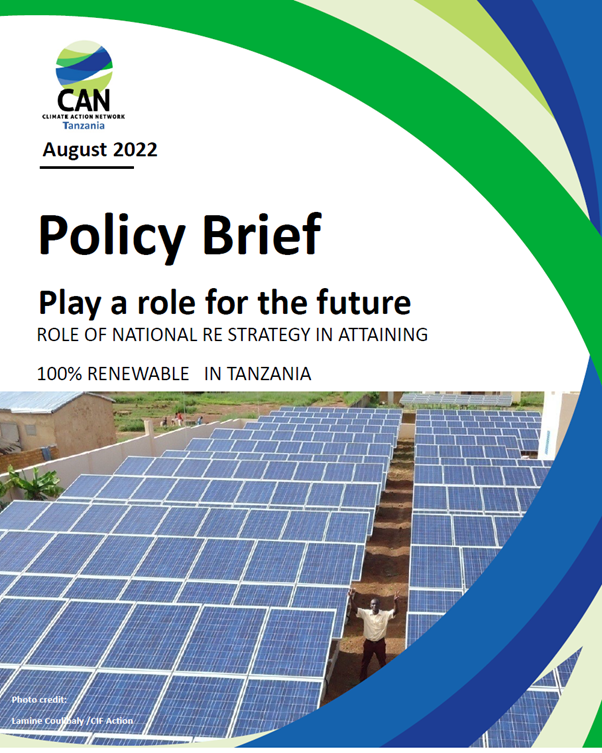
Published: AUGUST 10, 2022
High potential of RE to drive socio-economic development:
Currently the Ministry of Energy in Tanzania started to develop Renewable Energy strategy. Energy is the life blood for flourishing society and economy. Tanzania identified sufficient and reliable energy as enabler for a socio-economic development. Renewable Energy can provide the needed energy at lowest cost and mitigate the significant risks a dependency on a fossil fuel-based energy systems bring. Tanzania has excellent wind, solar, geothermal and biomass resources for power production but are still only 2% of Tanzania power mix. A renewable energy strategy (RE strategy) can tap this potential and built and enabling environment for investors and stakeholders to built a cost-effective, just and sustainable pathway to energy access for everyone. We developed a Policy Brief to inform the development of a RE strategy.
Research showed that 100 % RE is possible for Tanzania & a phase-out of fossil fuel production is necessary for a just and liveable future limiting global warming to 1.5 °C. Therefore, a stand-alone RE strategy must be built on two key goals: Fast-track phase-out fossil fuels and fast-track 100 % RE. To support the development of an effective standalone RE strategy we consulted with experts and stakeholders of the Tanzanian Coalition for Renewable Energy (TCRE). We identified key elements and recommendation that should shape the RE strategy. We condensed our insights in our latest Policy Brief that aims to inform the development of the RE strategy for Tanzania.
The RE strategy should be based on science-based and cost-effective scenarios promoting the transition to 100 % RE aligned with a just phase-out of fossil fuels. To be actionable it should contain an action plan/roadmap including a resource mobilization plan, M&E and establishment of a focal point. In specific annual sector targets based on cost-effective transition scenarios are need to keep constantly on track towards 100 % RE. To guarantee legal security of investor and stakeholders the RE strategy should be developed alongside a stand-alone RE policy framework.
Currently up-scaling of RE in Tanzania is facing several barriers inhibiting a fast transition to 100 % RE.The challenges range from a lack of data, lack of sectoral coordination, to strong focus on a centralized grid, unpredictable regulatory framework for RE and beyond. To overcome these barriers for proper scale-up of renewable energy solutions requires a stand-alone Renewable energy strategy that guides in having a comprehensive policy framework, institutional framework, clear packaged projects, and a long-term strategy for harmonization. a well-designed framework for renewable energy deployment can offer concrete opportunities to show synergies and complementarities among the three challenges faced by Tanzania: energy security, socio-economic development, and climate change.
The development of the strategy should be informed by the best available knowledge and science. Therefore, it should be based on a participatory stakeholder process including the knowledge of relevant stakeholders (private sector, CSOs, Academia research, development partner, LGA, and local communities) The process of developing a standalone RE strategy should be led by the Ministry of Energy (MoE) in close collaboration with the Vice President Office (VPO, responsible for environmental policy). We hope to contribute with our Policy Brief to an fruitful process to co-develop a RE strategy for Tanzania.
Learn in our Policy Brief: https://cantz.or.tz/publications/22
